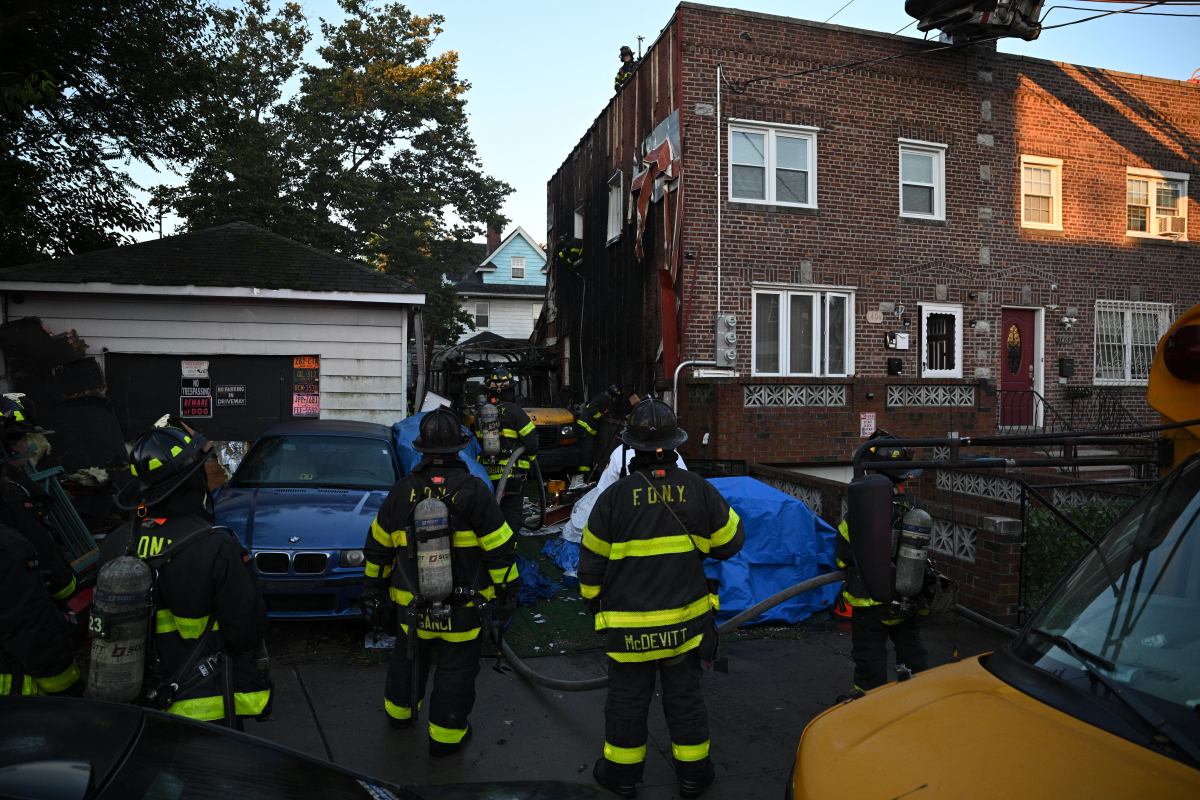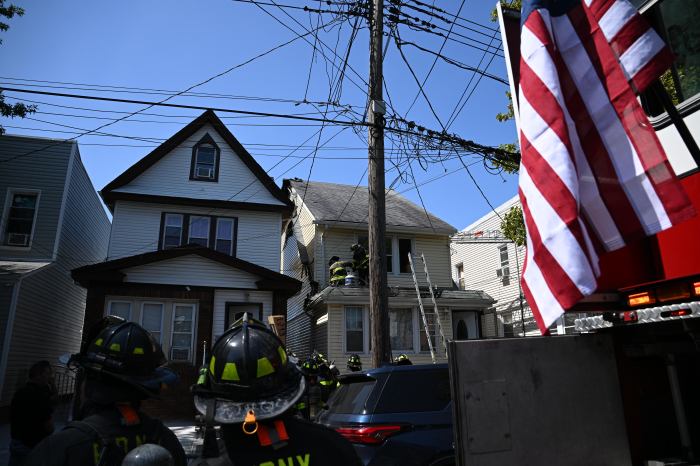Volume 74, Number 24 | Octuber 13 – 19 , 2004
Letters to the editor
Irwin and P.S. 64 made history
To The Editor:
Re “Lions and tigers and mega-dorm developers, oh my! East Villagers try to save a historic school building” (news article, Sept. 2):
In writing to support the East Village Community Coalition’s efforts to preserve P.S. 64 as an educational and cultural center, I would like to expand briefly on the nature and significance of Elisabeth Irwin’s work there, which set the stage for her more well-known accomplishments as the founder of the Little Red School House.
In 1916, the Public Education Association, an influential education reform and advocacy group, chose Elisabeth Irwin to head up what turned out to be a landmark experiment designed to test whether the progressive ideas advocated by people like John Dewey, and until that time tried mainly in small private school settings, could be applied successfully in the large public schools of the nation’s expanding cities. The results of the experiment at P.S. 64, along with a wonderful portrait of the school and the vital, hopeful immigrant community it served, are contained in her 1924 book, “Fitting the School to the Child.” Irwin’s classes couldn’t have differed more from the regimented environments in schools of the day. Interest, imagination, questioning and ample time set aside for play and physical exercise replaced dull routine, coercion and punishment as motivating factors in the lives of her pupils. Fieldtrips, classroom projects and aesthetic experiences replaced the typical regime of endless drill, recitation and rote learning. Elisabeth Irwin believed that children’s natural disposition was to create, explore and build, to solve problems and to try to make sense out of the world. Her school was a laboratory where children experimented with life and a community where they acquired and practiced democratic values.
Intelligence testing and homogenous grouping were, as The Villager article correctly points out, important components of Irwin’s experiment at P.S. 64. However, Irwin rejected the corollary notion, increasingly popular in the 1920s, of the school as social and economic sorting mechanism based on the determination of heredity. Intelligence testing usefully measured an important, though narrow, band of abilities traditionally associated with school success. Intelligence tests could provide the educator with a powerful tool to design and adapt curriculum to each child’s intellectual strengths, learning patterns and developmental needs. The full range of human possibilities, however, the infinite spectrum of human qualities and potentials, could not be gauged or predicted by a test. The child’s environment was far more important than heredity in fostering human development.
Elisabeth Irwin’s experiment at P.S. 64 was a success. No only were the children observed to be happy, creative and socially and emotionally well adjusted, but testing, beginning in the fourth grade, demonstrated academic achievement superior to that of students in the same range of ability who had been educated using traditional methods. The distinguished educator William Heard Kilpatrick would later comment that no one was more influential than Elisabeth Irwin in propagating progressive methods throughout the public schools of this country. The school she founded in 1921, today’s LREI — Little Red School House and Elisabeth Irwin High School — though it has been a private institution since 1932, has never forgotten its public origins or abandoned its civic mission, its experimental temper, its passionate advocacy for children or its role in fostering educational reform and innovation.
Nicholas O’Han
O’Han is director of education, Little Red School House and Elisabeth Irwin High School
Book fair critics twist the facts
To The Editor:
Whether Book Country was good for the park and the neighborhood has been, and will be, the subject of much discussion. We at N.Y.U. think the Village should be proud to host an event that celebrates literature and encourages reading. We respect the opinions of those who disagree, but they should base their arguments on the facts. Therefore, I would like to correct some factual errors that were recently printed in the letters to the editor section of The Villager and to address a quote in a recent Villager article that gave a misimpression.
One letter writer wonders why N.Y.U. was allowed to take over the park for the festival. N.Y.U. does not run or organize Book Country. We did allow them to use N.Y.U. space for lectures, panel discussions and author signings. We did not have any presence at all in the park, nor did we negotiate their presence in the park. The agreement to use the park for the festival was strictly between Book Country and the Parks Department.
The Sea Scouts, who one letter writer claims used to get paid to put the tents up for the Book Festival, were not in any way replaced by N.Y.U. Again, N.Y.U. did not organize or run Book Country. Book Country hired a private company to erect and disassemble the tents — N.Y.U. played no role in this.
Finally, one group claims there were “no Villagers” at the book festival. While I do not share their fear of “non-Villagers” visiting our neighborhood, I spoke with literally dozens of Village residents while I was enjoying the festival. In fact, The Villager printed some letters from longtime Villagers who wrote to express how much they enjoyed the fair.
N.Y.U. does not control Washington Sq. Park in any way, shape or form. However, we do provide financial assistance every year to the Parks Department to help maintain the park; we are providing funding to ensure that a maintenance fund is established to protect the Washington Sq. Arch; and we have committed $1 million to the overall renovation of Washington Sq. Park. N.Y.U. is proud of its commitment to one of the city’s greatest public parks.
The university believes that Book Country was and will be a good event for the park and the neighborhood, but we recognize that there are others in our community with different views. We welcome an open and honest conversation about this, but let’s base that conversation on the facts.
Michael Haberman
Haberman is New York University director of government and community relations
‘Contempt’ was all that registered
To The Editor:
I was very upset by the “Onboard the swing vote express” article by Ronda Kaysen in the Oct. 6 Villager. The importance of this election for one thing and the importance of voting as such were made fun of in a way that I thought was undermining of the whole democratic process. Whether your reporter liked getting up in the morning was entirely irrelevant, and her slapdash manner of talking about and to people simply reeked of superiority and an “it-doesn’t-matter-to-me-or-anyone” attitude. Is this the thing we as a country want to show ourselves as? Is this the attitude that lets Abu Ghraib in its worst happen? Contempt for people and for the direction of our country is fostered by such an article.
It happens that I have studied contempt and the harm it can do, both in the person having it and the person on the receiving end. I learned from Aesthetic Realism that it is the greatest impediment to one’s own well-being. This careful description by the founder of Aesthetic Realism, Eli Siegel, should be thought about by everyone for our own lives, and certainly during this crucial time in our country: “There is a desire in every person to think he will be for himself by making less of the outside world.”
Another great question, asked by Mr. Siegel, which we as citizens, have to ask ourselves is this: “What does a person deserve by being a person?” The beginning of the answer to that question as I see it is: Respect. I look forward to articles in the newspaper I have been reading for almost 50 years (!) that encourage our Greenwich Village neighbors to have more respect and — have less contempt!
Dorothy Koppelman
Renter’s nightmare
To The Editor:
I am writing this letter to tenants and the public so that they can have the awareness of what is happening to tenants in New York City and elsewhere. Tenants that are under the guidelines of rent control, SCRIE and rent stabilization know that the syndicate realtors want them out of their apartments. They can get three or four times the amount of rent because of the apartment shortage.
One of the techniques used is harassment. The super turns off intercoms and rings intercoms in the middle of the night. He also bangs on the door of your apartment and “saves” electricity by turning it off.
Another method of persuasion is having you mugged and assaulted. They hire and pay through a third party so that there won’t be any method of tracing the crime back to them. If it happens to you, call 911, get medical assistance and get on a police record so that you will be able to get continued medical help and receive compensation. To stop supers from breaking into your apartment, you can have your door secured with a Medeco lock and a fitted angle iron. You can get them at Hardware Mart, 151 W. 14th St. at Seventh Ave., just ask for Artie.
The supers are very good liars. The super and his partner often play the “now you see it now you don’t game.” They will take items and later return them to your apartment and may call you and say, “You are losing your mind.” If the super threatens you, call 911 and file a report.
If the syndicate realtors try to get you illegally evicted, call Legal Aid. They will advise you what can be done to help you. If you have to go to Housing Court they will represent you.
The super or his partner may put mice or rats in your apartment. Call 311. They will contact the Department of Health and you may be asked to file a report with the Department of Housing Preservation and Development as well as Health.
A car or van my try to run or back over you. It will be a “hit-and-run accident.” The syndicate realtors are ruthless and heartless and relentless in achieving their goal of getting your apartment. Call and go to the Metropolitan Council on Housing, 141 E. 23rd St. at Madison Ave., 212-979-0611, for advice and counseling on your apartment problems.
Be aware of your rights and what you can do to protect them.
P.S.: Tenants, write to your paper with any comments, thoughts, problems and concerns, needs and ideas that you have. It is not good to be forced to become homeless.
Bill Sireci

































